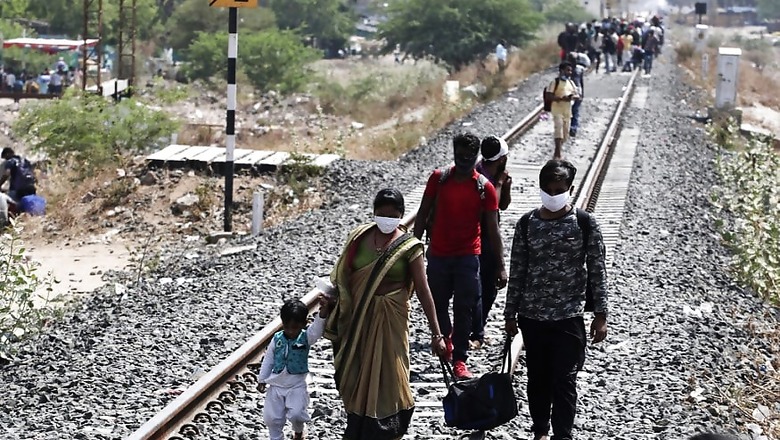
views
The migrant crisis is worsening by each passing day. The disturbing visuals of these migrant workers on the roads and their deaths on the way to native places are a chilling testimony of our insensitivity towards their plight. Their desperation to go home at any cost, even by putting their lives in danger, can clearly foretell the nature of the crisis the industry is going to face in the short and long run. It also reflects their present mental state and the deep impact of the crisis on their hearts and minds. The Pandemic has undoubtedly exposed India’s apathy towards the migrant workforce.
Migrant workers are considered as the backbone of the industrial sector but nobody has sincerely bothered about them when they are in urgent need of care and affection amid Covid-19 pandemic and lockdown. Their reverse migration is being seen as an additional burden on the state already struggling with the pandemic and enforcing law and order. The states are receiving them under some kind of socio-political pressure but not wholeheartedly as genuine citizens.
Merely an announcement packages or reforms may not be sufficient to convince them to return after the lockdown is finally over. If the central and state governments are seeing this pandemic as an opportunity, the only way forward is to instill a sense of social and financial security in the minds of migrant workers in order to convince them to return to their work again and become part of the development process to augment growth and development of our economy vertically and horizontally.
According to Amitabh Behar, Chief Executive Officer of Oxfam India who currently serves as the Vice-Chair of the Board of CIVICUS — a global alliance of civil society organisations and activists dedicated to strengthening citizen action and civil society across the globe, “The economy has collapsed due to this unprecedented challenge of Covid-19. The worst sufferers are the informal sector workers, daily wagers and the poor. We need a complete reboot of our economy and we must ensure that at least now we use this as an opportunity and build an environmentally sustainable model which is human economy, ensuring living wages to all and not perpetuating and furthering inequality.”
Dr Amir Ullah Khan, who is a Development Economist and served as Deputy Director and policy advisor to the Bill and Melinda Gates Foundation, said, “The migrant worker crisis we see today is far bigger than what is evident by way of nearly 8 million stranded workers trying to reach home, of more than 120 million jobs lost and the manner in which large scale sectors like construction are lying dormant because of the unavailability of labour. The crisis actually brings home the point that the Indian economy and its laws have treated workers very badly. Apart from the working conditions, the wages are abysmally low — 92 percent of female and 82 of male workers in India earn less than 10,000 rupees a month. An overwhelming majority earns far less than the minimum wage. On top of this, we have a looming unemployment crisis that started even before the Covid-19 disaster.”
“That is why it is not surprising that the migrant labour wants to go back home. Conditions at work are hostile, employers treat them badly and with so much uncertainty, there is no reason to stay in unhygienic and unsafe urban surroundings. When the lockdown is lifted and normal activity is restarted, these helpless workers will return as they have no other choice in a rural environment that does not offer any meaningful employment. If we have learnt our lessons, we will build a system that gives all workers in the formal and the informal sector a decent minimum wage and safe living conditions. India will not be able to get the business that moves out of China by continuing to provide such awful work conditions,” he said.
Dr Khan added, “The world if now paying attention to India’s poorly handled migrant worker situation. Visuals of people walking hundreds of miles to go home, getting mowed down by trains and trucks, are difficult to erase quickly and do not help improve the image of a country that treats its poor very badly. The migrant worker crisis will only be solved if the government tightens wage laws, sets standards for worker protection and hygiene. That is when foreign investors will get confidence to put their money here and the worker will get encouraged to return to the city that abandoned her when the going got tough.”
Prof Amitabh Kundu, one of India's topmost urban experts and a distinguished fellow at the New Delhi-based think tank Research and Information System for Developing Countries, said, “The migrants are going to their villages but they will not stay there for long because the rural economy may not be able to absorb them. Altogether they are 70 million, which includes children and wives who are not working. Out of this 72 million, 32 million are workers and out of 32 millions 12 million are in the organised sectors and 20 millions are in the unorganised sectors. The 20 million are in real danger and I feel that 4-to 5 million will stay because they might have been convinced by their employers.
As per workers’ registration and after adding the migrants the figure, we concluded that 14 to 15 million workers wanted to go to their villages because of the harvesting of Rabi crop, sowing of Kharif in a week or two and there was demand. The other reasons are that the workers are socially and psychologically very upset and want to go home. They should be allowed to go with proper means and their employers should give assurance of social and financial security to ensure their return.
Merely announcement of any kind of package or reforms may not be sufficient to convince them to return after the lockdown is finally over. If the state or the Central governments are seeing this pandemic as an opportunity then the only way forward is to instil the sense of social and financial security in the minds of migrant workers in order to convince them to return to their work again and become part of the development process to augment growth and development of our economy vertically and horizontally.
Experts also believe that India government should sign and ratify the following International Labour Standards if it is at all serious on safeguarding the rights of migrant workforce like. These are: ILO Social Security (Minimum Standards) Convention (1952) (No. 102), ILO Migration for Employment Convention (Revised) (1949) (No. 97), ILO Migrant Workers (Supplementary Provisions) Convention (1975) (No. 143), ILO Protection of Migrant Workers (Underdeveloped Countries) Recommendation (1955) (No. 100), ILO Equality of Treatment (Social Security) Convention (1962) (No. 118), ILO Migrant Workers Recommendation (1975) (No. 151), ILO Maintenance of Social Security Rights Convention (No. 157) (1982), ILO Domestic Workers Convention (2011) (No. 189), ILO Migration for Employment (Revised) Recommendation (1949) (No. 86) and ILO Domestic Workers Recommendation (2011) (No. 201).



















Comments
0 comment